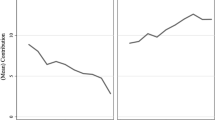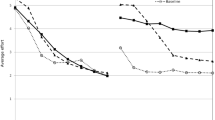Abstract
We use a sequential voluntary contribution game to compare the relative impact of a first-mover’s non-binding announcement versus binding commitment on cooperation. We find that a non-binding announcement and a binding commitment increase individual contributions to a similar extent. Since announced contributions systematically exceed commitments, in sessions with a non-binding announcement, second-movers tend to contribute more to the group activity than in sessions with a binding commitment. Yet, second-movers appear to be more motivated towards achieving a social optimum when the first-mover uses commitment. We also find that a non-binding announcement has a higher impact on individual propensity to cooperate than the ex post contribution of the first-mover. However, the failure to make announced contributions decreases cooperation even though the first-mover is reassigned in every period.
Similar content being viewed by others
References
Arbak, E., & Villeval, M. (2007). Endogenous leadership selection and influence. Université Lyon 2 Working Paper.
Andreoni J., Croson R. (2008) Partners versus strangers: Random rematching in public goods experiments. In: Plott C.R., Smith V.L. (eds) Handbook of experimental economics results Chap 82. Elsevier, Amsterdam, pp 776–783
Baliga S., Morris S. (2002) Co-ordination, spillovers, and pre-game communication. Journal of Economic Theory 105(2): 450–468
Balliet D. (2010) Communication and cooperation in social dilemmas: A meta-analytic review. Journal of Conflict Resolution 54: 39–57
Blume A., Ortmann A. (2007) The effects of costless pre-play communication: Experimental evidence from games with pareto-ranked equilibria. Journal of Economic Theory 132(1): 274–290
Bochet O., Page T., Putterman L. (2006) Communication and punishment in voluntary contribution experiments. Journal of Economic Behavior and Organization 60: 11–26
Callero P. (1994) From role playing to role-using: Understanding role as resource. Social Psychology Quarterly 57(3): 228–243
Charness G., Grosskopf B. (2004) What makes pre-game communication effective? Experimental evidence. Economics Letters 83(3): 383–389
Charness G., Rigotti L., Rustichini A. (2007) Individual behavior and group membership. American Economic Review 97(4): 1340–1352
Chen Y., Li S. X. (2008) Group identity and social preferences. American Economic Review 99(1): 431–457
Crawford V. (1998) A survey of experiments on communication via pre-game communication. Journal of Economic Theory 78(2): 286–298
Crawford V., Sobel J. (1982) Strategic information transmission. Econometrica 50(6): 1431–1451
Farrell J. (1987) Pre-game communication, coordination, and entry. RAND Journal of Economics 18(1): 34–39
Farrell J. (1988) Communication, coordination and Nash equilibrium. Economic Letters 27(3): 209–215
Farrell J., Rabin M. (1996) Pre-game communication. Journal of Economic Perspectives 10(3): 103–118
Fischbacher U. (2007) z-Tree: Zurich Toolbox for ready-made economic experiments. Experimental Economics 10(2): 171–178
Gächter, S., Nosenzo, D., Renner, E., & Sefton, M. (2010). Who makes a good leader? Cooperativeness, optimism and leading-by-example Economic Inquiry (forthcoming).
Gächter, S., & Renner, E. (2003). Leading by example in the presence of free rider incentives, University of St. Gallen Working Paper.
Genesove D., Mullin W. P. (2001) Rules, communication and collusion: Narrative evidence from the sugar institute case. American Economic Review 91(3): 379–398
Green, J. R., & Stokey, N. L. (1980). A two-person game of information transmission, Discussion Papers 418, Northwestern University, Center for Mathematical Studies in Economics and Management Science.
Güth W., Levati V., Sutter M., Heijden E. (2007) Leading by example with and without exclusion power in voluntary contribution experiments. Journal of Public Economics 91(5–6): 1023–1042
Hermalin B. E. (1998) Toward an economic theory of leadership: Leading by example. American Economic Review 88(5): 1188–1206
Holt Ch., Laury S. (2002) Risk aversion and incentive effects. American Economic Review 92(5): 1644–1655
Isaac R. M., Walker J., Thomas S. H. (1984) Divergent evidence on free riding: An experimental examination of possible explanations. Public Choice 43(2): 113–149
Krantz D. H., Kunreuther H. C. (2007) Goals and plans in decision making. Judgment and Decision Making 2(3): 137–168
Kruskal W. H., Wallis W. A. (1952) Use of ranks in one-criterion variance analysis. Journal of the American Statistical Association 47(260): 583–621
Levati V., Sutter M., van der Heijden E. (2007) Leading by example in a public goods game with heterogeneity and incomplete information. Journal of Conflict Resolution 51(5): 793–818
Longford N. T. (1994) Logistic regression with random coefficients. Computational Statistics and Data Analysis 17(1): 1–15
Mann H. B., Whitney D. R. (1947) On a test of whether one of two random variables is stochastically larger than the other. Annals of Mathematical Statistics 18: 50–60
Moxnes E., Heijden E. (2003) The effect of leadership in a public bad experiment. Journal of Conflict Resolution 47(6): 773–795
Muller L., Sefton M., Steinberg R., Vesterlund L. (2008) Strategic behavior and learning in repeated voluntary contribution experiments. Journal of Economic Behavior and Organization 67(3–4): 782–793
Offerman Th., Schram A., Sonnemans J. (1998) Quantal response models in step-level public good games. European Journal of Political Economy 14(1): 89–100
Ottaviani M., Sørensen P. N. (2006) Reputational pre-game communication. RAND Journal of Economics 37(1): 155–175
Palfrey T. R., Prisbrey J. E. (1997) Anomalous behavior in public goods experiments: How much and why?. American Economic Review 87: 829–846
Pollay R. (1968) The measurement of role differentiation. Sociometry 31(1): 120–124
Potters J., Sefton M., Vesterlund L. (2007) Leading-by-example and signaling in voluntary contribution games: An experimental study. Economic Theory 33(1): 169–182
Rabe-Hesketh S., Skrondal A., Pickles A. (2002) Reliable estimation of generalised linear mixed models using adaptive quadrature. Stata Journal 2(1): 1–21
Rabin M. (1994) A model of pre-game communication. Journal of Economic Theory 63(2): 370–391
Sally D. (1995) Conversation and cooperation in social dilemmas: A meta-analysis of experiments from 1958 to 1992. Rationality and Society 7: 58–92
Wilcoxon F. (1945) Individual comparisons by ranking methods. Biometrics Bulletin 1(6): 80–83
Author information
Authors and Affiliations
Corresponding author
Electronic Supplementary Material
The Below is the Electronic Supplementary Material.
Rights and permissions
About this article
Cite this article
Pogrebna, G., Krantz, D.H., Schade, C. et al. Words versus actions as a means to influence cooperation in social dilemma situations. Theory Decis 71, 473–502 (2011). https://doi.org/10.1007/s11238-011-9248-5
Published:
Issue Date:
DOI: https://doi.org/10.1007/s11238-011-9248-5




